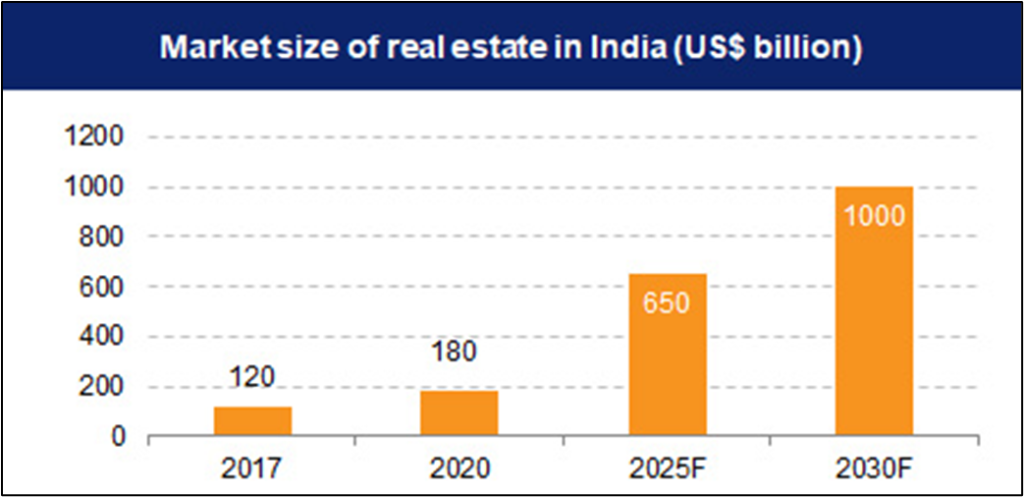
Real Estate Forecast Next 5 Years: Trends and Projections
January 18, 2024 . Real-Estate Industry . 10 min readEver wondered what lies ahead for India’s real estate in the next five years? Welcome to the forecast horizon of real estate — In this blog, we unravel the projections, unveil the trends, and explore the factors influencing the real estate forecast next 5 years, inviting you to join us on a compelling exploration of what lies ahead in this exciting chapter of growth and evolution. Whether you’re a buyer, seller, or investor, these insights will be your compass in navigating the evolving terrain.
Introduction to Real Estate Forecasting:
Real estate forecasting serves as the compass guiding industry stakeholders through the ever-shifting landscape. At its core, forecasting is a strategic tool, allowing individuals and businesses to anticipate market movements and make informed decisions. In the unpredictable realm of real estate, this foresight is invaluable, offering a proactive approach to challenges and opportunities. Trends wield a profound influence on the real estate sector, dictating the demand and supply dynamics, property values, and overall market sentiment. Understanding and deciphering these trends is akin to unlocking a blueprint for success, especially in the context of the real estate forecast next 5 years.
Current Market Overview:
India’s real estate market has witnessed robust growth in recent years, a trend expected to continue according to the real estate forecast next 5 years. This growth is driven by a confluence of factors, including favorable government policies, a surge in urbanization, and rising disposable incomes. This flourishing sector is not only generating employment opportunities across various industries but is also emerging as a significant contributor to the nation’s GDP.
A key driver of this growth is the increasing demand for homes, mainly due to a growing middle class and a large young population. This results in a continuous need for affordable housing. In response to this demand, developers are undertaking projects aimed at various financial segments, aiming to meet the changing preferences of potential homebuyers.
In addition to the residential segment, industrial real estate plays a crucial role in India’s economic landscape. The proliferation of businesses and multinational corporations has resulted in a noticeable uptick in office spaces nationwide. Tier 1 cities such as Mumbai, Delhi, and Bengaluru are witnessing robust demand across all segments, with a particular emphasis on luxury and high-end properties.
On the other hand, Tier 2 and 3 cities are experiencing a pronounced surge in demand for affordable housing. This trend is propelled by escalating urbanization and the comparatively lower property prices in these regions. Despite the promising growth, the Indian real estate sector grapples with challenges such as land acquisition issues, regulatory complexities, and periodic financial crises. To instill accountability, measures like the Real Estate Regulation Act (RERA) have been instituted to navigate and regulate the sector effectively.
What Are The Best Cities To Invest In Real Estate In India?
While investing in real estate in India holds promising profitability certain cities stand out as particularly lucrative options.
Bangalore, also known as the Silicon Valley of India, has a fast-growing real estate market, a crucial consideration in the real estate forecast next 5 years. This growth is fueled by the thriving IT industry, attracting many professionals to move there and contributing to the city’s robust real estate sector.
Pune is another appealing city for investors, drawing attention with its excellent infrastructure, strategic location, and esteemed educational institutions. The demand for both residential and commercial properties in Pune is consistently high, making it an attractive destination for real estate investments.
Mumbai, recognized as the economic hub of India, remains a perennial favorite for real estate investors. Despite being one of the costliest cities in terms of property prices, Mumbai offers a compelling return on investment. This is attributed to its burgeoning population and limited availability of land.
These cities, namely Bangalore, Pune, and Mumbai, emerge as some of the prime areas for real estate investment in India today. Factors such as financial stability, growth prospects, and ongoing infrastructure development contribute to their attractiveness. However, it is crucial for potential investors to conduct thorough research as individual preferences can vary significantly before making any investment decisions.
Reasons Behind Real Estate Boost: Budget and Tech Advances
The Union Budget significantly influenced the real estate industry, especially in meeting the rising demand for affordable housing. Measures like expanding the Affordable Housing Program, increasing PMAY allocation, and raising the income tax deduction for home loan interest provided a substantial boost to the entire sector.
In the post-COVID era, technology emerged as a silent hero, playing a pivotal role in shaping the real estate forecast for the next 5 years by transforming traditional challenges. The adoption of PropTech gained momentum, reshaping how property transactions occur. Technologies like AI-driven analytics and blockchain for secure transactions have become drivers for efficiency and trust, offering positive prospects for the sector. Developers and investors are optimistic about the sector’s future growth, foreseeing transformative changes in 2024. The industry is strategically shifting towards a balanced future, aligned with economic sensibilities. With government stability, consistent interest rates, increased employment, and higher private investment, the sector anticipates an environment fostering sustainable and robust growth.
Unveiling the Real Estate Forecast Next 5 Years
In a recent report titled ‘India Real Estate: Vision 2047,’ jointly released by Naredco and Knight Frank India, the real estate forecast next 5 years paints a compelling picture. Projections indicate that the Indian real estate sector is poised to expand significantly, reaching USD 5.8 trillion by 2047. This growth is expected to contribute 15.5% to the total economic output, a substantial increase from the existing 7.3%. According to Rajan Bandelkar, President of NAREDCO India, the forthcoming decades will witness a remarkable transformation in the Indian economy and real estate sector, acting as a driving force for the nation’s multifold economic expansion. Shishir Baijal, Chairman and Managing Director of Knight Frank India, emphasizes the pivotal role of real estate in this expansion, with private equity investments projected to surge to USD 54.3 billion by 2047, reflecting a Compound Annual Growth Rate (CAGR) of 9.5% from 2023 to 2047.

Image Source: www.ibef.org
Furthermore, the Indian real estate sector is anticipated to achieve a market size of US$ 1 trillion by 2030, a considerable rise from US$ 200 billion in 2021, with an expected contribution of 13% to the country’s GDP by 2025.
The real estate forecast next 5 years gains clarity as highlighted in the Economic Times Housing Finance Summit underscores the current housing situation, revealing that only three houses are built per 1,000 people annually, falling short of the required construction rate of five houses per 1,000 population. This shortage is especially pronounced in urban areas, estimated at around 10 million units. Addressing this deficit, an additional 25 million units of affordable housing are deemed necessary by 2030 to accommodate the anticipated growth in the country’s urban population.
Factors Driving India’s Future Real Estate Outlook
As India’s real estate market strides into a new era in 2024, the real estate forecast next 5 years suggests a promising landscape with a blend of challenges and unprecedented opportunities. The industry’s robust growth prospects, fueled by end-user demand, were evident in the substantial spike in luxury home sales in 2023. This surge propelled overall sales in top markets to over 2.3 lakh units, with a forecasted increase to 3 lakh units in 2024. Additionally, optimism surrounds the commercial real estate sector, especially in the domain of office spaces, with expectations of a significant rebound.
The residential real estate market’s recovery in 2023 has contributed significantly to India’s growth story, with an anticipated 15-25% spike in new property launches and a crucial 10-15% improvement in sales for 2024. The increasing need for both residential and commercial buildings, driven by the growth of the middle class and government initiatives like Housing for All and the Mission for Smart Cities, reflects a positive trend in the industry.
The implementation of the Real Estate Regulatory Authority (RERA) has enhanced industry transparency and responsibility, attracting both domestic and foreign investors. Technological advancements, such as virtual reality experiences and online real estate platforms, have simplified property transactions, making the industry more accessible. Despite challenges, including financial limitations and project delays, the real estate market remains buoyant due to favorable demographics, government reforms, and technological advances, positioning it for continued growth in the future.
Conclusion
The Indian real estate sector embarks on a transformative journey in 2024, marked by challenges and unparalleled opportunities. The anticipated surge in luxury home sales and the noteworthy rebound of the commercial real estate sector underscore the promising trajectory ahead. Crucially, government initiatives like Housing for All and regulatory reforms such as RERA contribute to heightened transparency and bolster investor confidence. As industry leaders, the imperative lies in prioritizing strong governance to deliver high-quality products and instill trust among stakeholders. Despite persistent challenges, including high land costs and infrastructure bottlenecks, the sector’s proven resilience in innovation bodes well for its future. Overcoming these hurdles is paramount for emerging stronger, more future-oriented, and closely aligned with the evolving needs of the population. Acknowledging real estate’s substantial multiplier effect, sustained government support remains essential, ensuring a seamless and sustainable growth path for the industry, and solidifying its integral role in the broader Indian economy.



